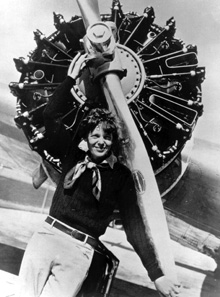
Amelia Earhart was much more than a historical figure or the subject of an unexplainable mystery, she was an American original whose spirit still fascinates today. And as the title character in a brand new theatrical work by a young and emerging group of Chicago artists, her legend inspires a new generation over 70 years after her disappearance. The title of the theatrical fantasy, "Amelia Earhart Jungle Princess" brings smiles to even those who rarely venture into a theatre, as three of the founding members of The New Colony discuss their debut production and the challenges of bringing a new theatrical adventure to life. Author James Asmus believes Earhart is the perfect subject for dramatization, as "She was enigmatic for her death but also inspirational because of how ahead of her time she was, fighting a gender politic war before there was a gender politic war at that level. She broke the rules by just pretending there weren't any. She was shattering barriers that still seem significant now."
According to Artistic Director Andrew Hobgood, The New Colony hopes to break a few boundaries of its own as it seeks to create "a body of people living and working together to strip away all the anonymity of the typical theatre process. When our audience walks in the door, they're not just random faces who came in and bought a ticket." In fact, The New Colony isn't offering regular one-time theatre tickets, but rather one price "show passes" that allow an audience member to return an unlimited number of times for the run of the play. "We don't want our shows to be a one time experience," Andrew says, "We want to make it easy for people to come back and see the show over and over, and to create shows people will want to see multiple times." It's what Andrew calls a "People First" concept that should certainly make The New Colony stand out from all the companies competing for audience's attention this season.
Executive Director Gary Tiedemann says the goal is pretty simple. "We want you to have a lot of fun seeing this show." Tiedemann, who works in voice-overs and is also understudying several roles in "Amelia," is in charge of the business aspects of getting the new start-up company on its feet, and as he says that involves a lot of paperwork, marketing and fundraising. Gary addresses the challenges of "Creating the amount of energy to begin moving an enormous object, sharing your vision so people understand where you want to go. A lot of times you just have to go do it and people will see and want to join you." The company is actively pursuing direct marketing, personal interactions and relationships to spread the word throughout the Chicago area to both the theatre-going and non theatre-going public.
The company had its first fundraiser August 17 at which actor/singer Michael Ingersoll from the Chicago cast of "Jersey Boys" performed three songs, and brought in a surprising outpouring of support from "new friends," according to Gary. "I've been amazed at the number of donations we've gotten without having even put up a show yet. We've had several $1,000 donations come in and my jaw drops, so we feel we have a bar we have to live up to." What is the secret to the lure? "We're working to bring high quality, creative, inspirational individuals together to create a great product," Andrew says. The company, which James describes as the National Honors Society members of theatre, is comprised of "A pastiche of people with remarkable skill sets coupled with professionalism and dedication. What we're doing takes so much commitment, talent and fortitude. Our hook to get people of this caliber is to make them look as good as they can and to give the actors parts they rarely get which they can be proud of."
Another facet that makes The New Colony unique is its improvisational and collaborative approach to the creation of original theatre work. "Improvisation really taps into the instincts of the actor and allows them to speak with the character's voice," Andrew feels. "James might write a line and will ask the actor to speak the line the way their character would actually say it. It's about tapping into some human instinctual core and pulling that into theatre, whereas theatre usually begins with a pre-scripted written page that no one in the process has been involved with, they're just trying to adapt themselves to it. Here we adapt the product around the people involved in the original creation."
 Where most authors are notoriously protective of their work, James actually welcomes the collaborative contributions he receives from the cast. "I find what I'm writing has benefited from this process verses things I've written in a sort of vacuum, handed off to someone and have them take my words as law. I would rather have the best end product. It's been really engaging giving actors enough room to experiment with their instincts. I've found that some times the best end product is to use an actor in a different way than I originally thought the character would go. With the villains in ‘Amelia Earhart,' once we took the scripts out of their hands and let them play with it, they found this darkly funny way to do the scene that before had been really straight faced. Honestly, I'll admit my writing had fallen into melodrama a bit and I wasn't happy with it. They found this vein of dark, dark comedy I would not have expected, a counter-intuitive choice that really paid off. It's about the experience of the audience and finding the best way to use your actor to be enjoyable for the audience."
Where most authors are notoriously protective of their work, James actually welcomes the collaborative contributions he receives from the cast. "I find what I'm writing has benefited from this process verses things I've written in a sort of vacuum, handed off to someone and have them take my words as law. I would rather have the best end product. It's been really engaging giving actors enough room to experiment with their instincts. I've found that some times the best end product is to use an actor in a different way than I originally thought the character would go. With the villains in ‘Amelia Earhart,' once we took the scripts out of their hands and let them play with it, they found this darkly funny way to do the scene that before had been really straight faced. Honestly, I'll admit my writing had fallen into melodrama a bit and I wasn't happy with it. They found this vein of dark, dark comedy I would not have expected, a counter-intuitive choice that really paid off. It's about the experience of the audience and finding the best way to use your actor to be enjoyable for the audience."
Hobgood and Asmus worked together last summer on an original musical called "Love is Dead" for Annoyance Productions, which started the engines turning for this new venture. "We started tinkering with the collaborative process we use for all of our shows," Andrew says, describing the ensemble method that "gives the actors a voice and good deal of control over the final product." While the improvisation techniques developed by Second City, Annoyance and other Chicago troupes are well known, The New Colony intends to use the tools for theatre pieces that are not just sketch comedy. Fusing the comedy traditions with more traditional theatre storytelling, The New Colony reaches for "a bigger spectrum than just to get a laugh." All of us started with traditional theatre backgrounds, separately we fell into the Chicago improvisation tradition and now we're circling back to a more traditional theatre world, trying to bring both of these worlds together."
Naturally, "Amelia Earhart Jungle Princess" promises a great deal of humor in dealing with its subject, and James is quick to remind audiences this is purely a work of imaginative fiction inspired by a real life person. It started brewing in James' mind when he had been asked to submit a pitch for Chicago's acclaimed House Theatre. Before The House's production of "The Sparrow" debuted, James realized that they hadn't had any female centered shows, "and since they do so much with mythology I tried to think of a mythos that was female centric." He started thinking of 1950's pulp jungle women's novels. Around the same time, he saw a program on the History Channel about great unsolved mysteries, and decided that Earhart would make a fascinating subject for another play. The two ideas eventually entwined, although James decided not to make a pitch for The House.
"I realized these two ideas were the same show, that the crazy adventures that Amelia Earhart was getting involved in were this jungle pulp world of Tarzan serials, Marvel comics, post-Kipling, much more throbbing, visceral world. As soon as that idea stuck, it tickled me, the juxtaposition of this iconic figure wearing the pilot's cap and torn clothes swinging around the jungle. As with the Tarzan ethos, we have someone from the civilized world encountering this person, but instead of a savage they encounter a mythic cultural figure." James hopes that his vision will amount to "A visceral, enjoyable, exciting show you've never seen before."
History also plays a role in the two upcoming productions scheduled for New Colony's debut season. In spring 2009, Evan Linder's "Frat" looks at the real-life subculture of Southern college fraternities, while Hobgood and Asmus' new musical "Tupperware" explores the founding of the company that changed American dinnertime forever. Andrew, James and Gary all feel fortunate to be working in a city as creative and daring as Chicago. As James says, "Chicago is the American city where the art of theatre progresses and New York is where you sell that theatre. For us it's a duty not to do plays and musicals based on mediocre 80's movies. I was so inspired by our first meeting to discuss ideas; we had a rough map of five years worth of 3 original shows a year." All three are invigorated, as Andrew says by "Going back and embracing the Chicago roots of creating great original theatre around fascinating stories and deep characters you can invest yourself into."
"Amelia Earhart Jungle Princess" will have previews September 26 and 27 at 8:00PM and will officially open on September 29 at 8:00PM. The show will run Thursdays through Saturdays at 8:00PM and Sundays at 7:00PM at The National Pastime Theater at 4139 N Broadway St. Show Passes are $28 and $15 for Preview Passes. Industry/Student Show Passes are $15 and $8 for Preview Passes. Passes go on sale September 15th at www.thenewcolony.org or by calling 800-838-3006. Show Passes to New Colony productions allow the purchaser to see the show for which the ShowPass was purchased an unlimited number of times. Preview Passes are only good for one viewing.
Joe Stead
Theatre In Chicago News Contributor Joe Stead has spent over 20 years as a critic, director, designer and performer. His reviews currently appear online at www.steadstylechicago.com.

 Follow Us On Twitter
Follow Us On Twitter